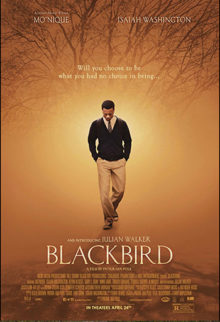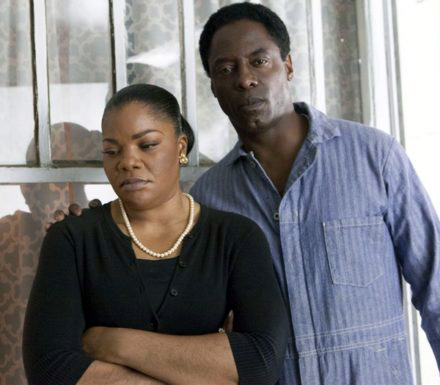 Blackbird
Blackbird
Directed by Patrik-Ian Polk
Based on the novel by Larry Duplechan
Premiered February 16, 2014 at the Pan African Film Festival
Drama/Romance
99 min.
Review by Stephen O. Murray
September 8, 2015.
I liked the characters in the adaptation by Patrik-Ian Polk (Noah’s Arc: Jumping the Broom, The Skinny) of Larry Duplechan’s 1986 novel Blackbird.
The movie keeps the ludicrous exorcism that is what I best remember from the novel. Both the straight jock friend, Todd [Torrey Lamarr] and the white boyfriend Marshall [Kevin Allesee] of protagonist Randy Rousseau [Julian Walker] seem too good to be true, as does the general ready acceptance by everyone except Randy and his guilt-tripping mother [Mo’Nique] that he is gay. I also liked the smart-mouthed gay friend, Efrem [Gary LeRoi Gray] and the gospel singing of Walker’s Rousseau.
 Most of all I enjoyed his dreams, especially the opening one of a soulful duet with Todd at the end of which Todd rips off his choir robe under which he was wearing nothing—at least above their chest (which is where the shot’s frame sticks). Todd also figures in the final dream in which he predicts/reveals the futures of the characters.
Most of all I enjoyed his dreams, especially the opening one of a soulful duet with Todd at the end of which Todd rips off his choir robe under which he was wearing nothing—at least above their chest (which is where the shot’s frame sticks). Todd also figures in the final dream in which he predicts/reveals the futures of the characters.
A surprise is that Isaiah Washington appears as the supportive father. Washington also was a producer of the film, presumably working on scrubbing out the slurs that got him written out of Grey’s Anatomy in 2007. That’s pretty much the only new ground of the movie. Another surprise is the general lack of homophobia in Polk’s hometown of Hattiesburg, Mississippi (see “too good to be true” above). The book was set in southern California two decades earlier, and I have no idea why the protagonist’s name was changed from Johnnie Ray to Randy.
The movie would have had a greater impact (though the easy acceptance would have been even more implausible) had it been made sooner after it was published—in the late-1980s, or at least before Glee. And before Tarell Alvin McCraney’s play Choir Boy, centering on a similarly 17-year-old African American tenor grappling with acknowledging his homosexuality. (The play had full-frontal nudity, while the movie camera never goes below the waist in its scenes of love or of bed except for a very passing glance at Walker’s buns.)
© 8 September 2015, Stephen O. Murray

